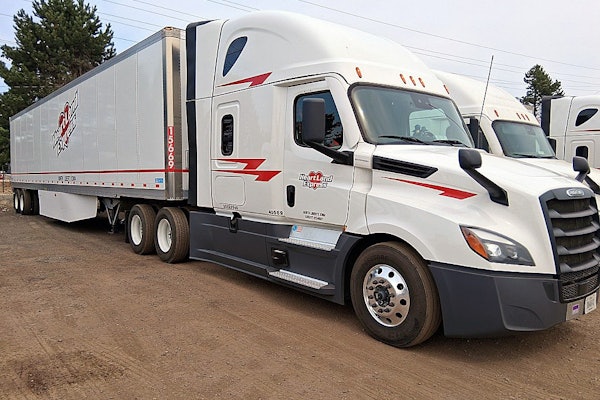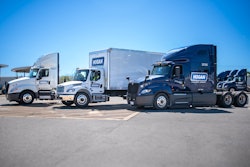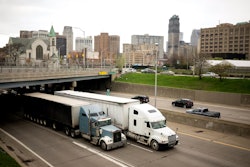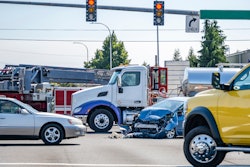Prime Inc. cannot recover attorneys fees despite its victory in a recent round of litigation with the Owner Operator Independent Drivers Association, the U.S. Court of Appeals for the Eighth Circuit ruled. In reversing a lower court ruling, the appeals court said it did not believe Congress intended to single out truck owner-operators “to bear the unique burden of a mandatory fee shifting provision in favor of defendants.” (OOIDA vs. New Prime; Case No. 04-1788)
OOIDA may pursue a class-action lawsuit against USIS Commercial Services to obtain damages and court and legal costs for alleged violations of the Fair Credit Reporting Act by DAC Services, a federal judge in Denver ruled. (See “Law,” August 2004.) U.S. District Judge Robert Blackburn declared, however, that private parties may not seek an injunction, declaratory judgment or similar relief under FCRA. (Civil Case No. 04-RB-1384)
U.S. Supreme Court will hear Volvo Trucks North America’s appeal of a dealer’s lawsuit that led to a $4 million jury verdict against the manufacturer. Fort Smith, Ark.-based Reeder-Simco GMC had argued that Volvo gave other dealerships deeper price discounts on trucks as part of an effort to drive consolidation among dealer owners.
Parties representing International and Volvo truck dealers filed suit in U.S. District Court in Philadelphia against Detroit Diesel contending that the engine maker forced them to pay higher prices for Detroit Diesel engine parts than dealers whose brands were affiliated with DaimlerChrysler.
Q We have been told that if our driver signs for a shipment in good order and damage is noted at time of delivery, as a carrier we are liable for the damage regardless of its cause. Can this be right?
A With limited exceptions, which I will discuss, under the Carmack Amendment (49 U.S.C. 14706) a carrier is liable for damage to goods in its care, custody and control, regardless of the cause. When you accept a shipment in apparent good order and damage is noted upon delivery, the law presumes you are liable. You bear the burden of proving that one of five common law exceptions applies.
In 1964, the Supreme Court in Missouri Pacific Railroad Co. v. Elmore & Stahl (377 U.S. 134) held that a motor carrier is liable for the cargo transported unless it can prove that the loss was caused by any of the five following defenses:
* Act of God;
* Act of public enemy;
* Act of public authority;
* Act of shipper;
* Loss or damage by the inherent vice or nature of the goods.
Three of these exceptions rarely apply. The act of God defense only is available when the loss, damage or delay is caused by truly extraordinary and unforeseen natural occurrences such as flood, lightning, earthquake, hurricane, etc. Ordinary inclement weather doesn’t count, and if the cause is not a natural disaster, the defense does not apply. Act of public enemy applies only when the loss is caused by a foreign military force. The act of a common criminal or thief does not provide a defense. The acts of a terrorist might qualify, but to my knowledge that case has not been presented. Similarly, act of public authority rarely is invoked. This exception applies when the loss is the result of police action such as a seizure of the freight, quarantine, etc.
The two remaining defenses are used more frequently. The defense that the loss was caused by inherent vice and the nature of the goods is available when “existing defects, diseases, decay or the inherent nature of the commodity” cause it to deteriorate with the lapse of time. Concealed infestation, fermentation, decay, corrosion, rusting and freezer damage all have been topics of inherent vice.
The act of shipper defense is by far the most popular basis for denying claims. Insufficient packaging and improper loading or bracing fit under this common law defense. Shippers must package items in a manner that will sustain the ordinary wear and tear of transportation. Carriers can rely on packaging standards and retain experts who can help them prove that loads shifted, boxes were crushed and product was damaged because the packaging was deficient. As a carrier, you have a duty to make a reasonable inspection and to correct any defects that can be discovered, but you have no liability for loss caused by latent packaging defects.
Your ability to use the act of shipper defense successfully is enhanced greatly when the bill of lading clearly describes the load as “shipper load and count” or words of similar import. The statute provides that the carrier has no liability for damages caused by improper loading if the shipper loads the goods under these conditions.
Importantly, to use any of these defenses, you must demonstrate affirmatively that no act or omission on the carrier’s part during the transportation contributed to the loss. For example, if freezer damage or spoilage is the issue, you must be prepared to show that you did not have an opportunity to inspect the shipment at the time of pickup and that your temperature recorder shows the product was maintained within required tolerance during transportation.
Courts have held that even the shipper’s negligence will not excuse your contributory negligence and hence liability under Carmack. See Fine Foliage of Florida, Inc. v. Bowman Transportation, Inc., 901 F.2d 1034 (11th Cir. 1990). So if you deny a claim based on one of the exceptions, be prepared to carry your burden of proof to show that your company was not at fault in causing the loss.









